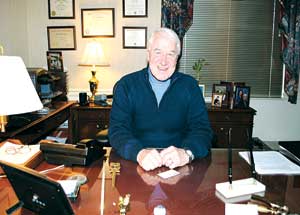Editorial
Front Page - Friday, March 5, 2010
Speech and Hearing Center strives to help as many as possible
Stephanie Coward
 Howell Hathorne, president and CEO of The Speech and Hearing Center, has worked at the center for 44 years. During that time, technological advances have led to more individuals receiving treatment.
- Stephanie Coward
Howell Hathorne, president and CEO of The Speech and Hearing Center, has worked at the center for 44 years. During that time, technological advances have led to more individuals receiving treatment.
- Stephanie Coward
Howell Hathorne dropped out of school, got a job and re-enrolled in classes all during the same day. Over 50 years later, Hathorne, president and CEO of The Speech and Hearing Center, said that he is grateful for life’s intersections.
The school’s music director saw something in Hathorne and refused to let him quit, even if it was to support his family. “Had that woman not done that, I would have probably been working at a hardware store,” Hathorne said. Not only did she keep him in school, she also got him a job that would work around his class schedule.
“There have been some one-time encounters that directed me so precisely that they’re almost unquestionable,” he said.
Another occurrence while he was working at Sears directed him into speech and language pathology. His mother’s friend told him he needed to go back to school; she also told him to rethink his course direction. “You should be in speech pathology, not in public speaking,” she informed him. She directed him to the speech and language department at the University of Southern Mississippi. Once again, grateful for the advice, he followed it.
Near the end of grad school, he headed to a conference in Chicago. While there, he was also set to meet with a department head from Kansas University; they planned to discuss his enrollment in the PhD program. At a diner, during his trip, he sat next to a lady from Chattanooga. She told him they had a speech pathologist opening at the center and asked him to speak with the director. They never crossed paths, but there was a letter waiting for him at home, which offered an interview. Hathorne and his wife, Martha, were heading to Chattanooga.
He began working at the center, as a speech pathologist, less than a week after graduating. It has been 44 years, and Hathorne believes he is where he was always meant to be. It helped, of course, that the Soso, Miss. native felt right at home in the Scenic City.
“It was not like moving to a strange place … This place was just as friendly as where we lived,” he said. “I haven’t looked back to Kansas.”
The Speech and Hearing Center treats children and adults with speech and auditory problems. The center’s staff works hard to ensure that as many people as possible are helped. A referral is not required to be seen and while they accept insurance, they also work out fee adjustments with other patients.
Along with offering free hearing and speech tests to children under 5, the center distributes a development scale sheet for parents so they can determine if their child is on track. The scale sheets are put in pediatricians’ offices, at the health department, on the center’s Web site and anywhere else the staff thinks it has the potential to help others.
Technological advances have greatly enhanced the field since Hathorne began his career. Hearing aides can be fitted and tuned to specific frequencies so that those who were not candidates 15 years ago, can enjoy a renewed sense of hearing with the miniscule devices. “With everything that comes along, we’re able to better help,” he said. “To enhance and sustain the quality of life is our mission statement.”
There has also been a change in how hearing-impaired children are treated. Hathorne said years ago children with hearing impairments were generally placed in special education classes, as it was assumed they were developmentally delayed. Today, more children are being accurately diagnosed, and that isn’t because hearing problems are more prevalent in children; the ability to detect, diagnose and treat has increased along with awareness of the issue. “The earlier you see them, the earlier you diagnose them, the earlier you can intervene,” Hathorne said. The most crucial time to ensure optimum diagnoses and treatment is between 18 and 32 months.
The center is an affiliate of the United Way Agency and gets some of its funding from the agency. It also receives funding from Hamilton County, but most of it, according to Hathorne, comes from revenue from the services provided. “Without those funds and some civic club contributions … we wouldn’t be able to adjust fees for people and wouldn’t be able to see some of the ones that we see,” Hathorne said. “We have never – in the 44 years that I’ve been here – had to turn anybody away because they didn’t have funds because somehow or another, we would work it out.”
Being a nonprofit, the staff must continuously strive to do more with less. “Our staff has responded to that. Last year, they each gave up a week of annual leave to work an extra week and generate funds for the center.” Hathorne said. “They’re focused and the staff keeps thinking of ways to be more efficient, and that allows us to see more people.”
The center’s Web site can be found at www.speechhearing
.com.
|
|